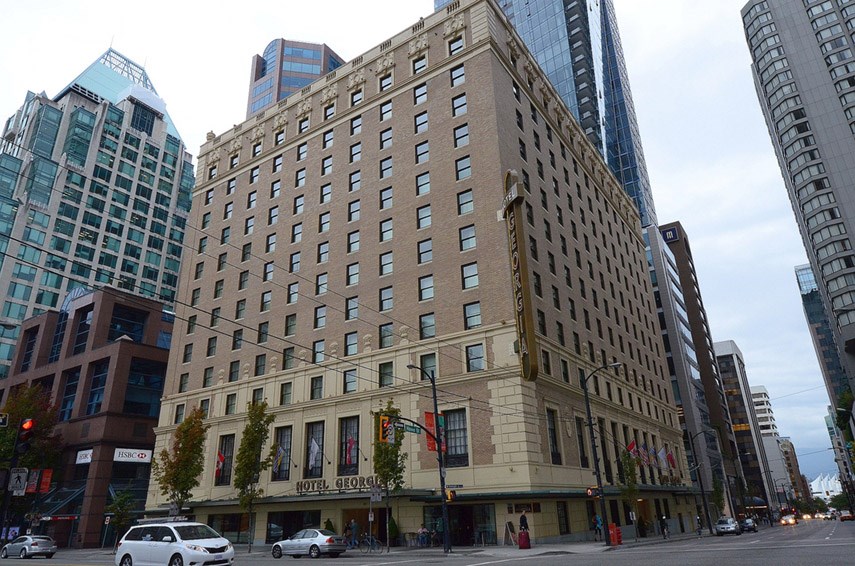Western Canada’s hotel business is on the upswing, but new supply is flatlining as developers face high land prices in Vancouver and lacklustre growth in the recovering Alberta and Saskatchewan markets.
“People, not surprisingly, are not going out to start new projects in Alberta and Saskatchewan right now,” Scott Duff, vice-president, Western Canada, with CBRE Hotels told industry executives at the annual Western Canada Lodging Conference in Vancouver in mid-November. “The price of entry in the Lower Mainland area is obviously extremely high right now and the competition for land is fierce.”
Tighter supply supports higher room rates, of course, but with travel to Canada surging thanks to favourable exchange rates and a kindler, gentler milieu than the U.S. offers, there’s room for new construction.
Nationally, room rates increased 7 per cent in 2017 to an all-time high of more than $100, the strongest growth in a cycle that’s been strengthening for eight straight years.
“It’s interesting because the last couple of years we’ve seen [revenue growth] led primarily by [daily rates]; this year we’re not only seeing [daily rate] growth, but we’re also seeing demand up,” observed Carrie Russell, managing director of valuation and advisory firm HVS Canada in Vancouver.
The growth isn’t due to the traditional regions, however.
Arrivals were up 3 per cent over the past year from Europe and 4 per cent from the U.S. Asia performed well, sending 7.4 per cent more travellers to Canada. But traffic from Mexico is up 51 per cent.
“They’re not seeing the U.S. as being very welcoming to them right now,” Russell said, saying the activity positions local hoteliers for another good year in 2018.
“There really doesn’t seem to be an end to this cycle that’s visible on the horizon,” Russell said.
Where to put everyone is another question.
Marriott has completed three hotels in Metro Vancouver, including the dual hotels that anchor the Parq casino development in downtown Vancouver. Executive Group’s new Exchange Hotel in the Vancouver core will introduce 202 rooms in 2018, but there’s precious little else on the horizon.
“There’s demand for hotels. The challenge is finding sites that are affordable and that you can make the economics work,” Russell said. “Hotel properties are no longer the highest and best use for the land.”
This is where the Exchange Hotel points the way, transforming part of a planned office tower into the kind of mixed-use property likely to become more common as operators try to secure key locations at prices that work.
“Hotel development can’t compete head-on with residential; the two are in a war in Vancouver,” said Curtis Gallagher, a broker with Cushman & Wakefield Ltd.
Vancouver land for residential development has reached more than $450 per square foot, according to architect and developer Michael Geller.
“I don’t think potential stand-alone new [hotel] builds will pencil out,” said Azim Jamal, co-founder and CEO of Pacific Reach Properties Ltd., which bought the Rosewood Hotel Georgia at the end of July in a blockbuster $145 million deal. The investment was a way into the market, but also indicative of where hotel pricing is headed.
Alternatively, owners are transforming older properties into next-generation destinations.
Kalla Holdings Ltd. got hip to the idea in 2011 with the 72-room Burrard Motor Inn while Bosa Development Corp. followed suit with a $60 million makeover of the Empress in Victoria. Watch for more to follow in 2018, even in places like Nelson, where the old Savoy Hotel has been renovated to host several businesses in addition to a boutique hotel, and also Revelstoke, where ongoing renovations to the former Canyon Motor Inn are building a reputation for the Stoke Hotel chain.
“What has been interesting to see in other parts of the country is people being very creative,” Duff said. “They perhaps may be taking a larger hotel and split-branding it, adding onto parts of it, demolishing parts of it, and in some cases really invigorating larger, full-service hotels that have great locations, great bones.”
Brightening prospects for 2018 is a surge in Chinese tourism. A deal announced in September 2016 at the end of Prime Minister Justin Trudeau’s visit to China designated 2018 the Canada-China Year of Tourism.
This creates opportunities for hoteliers to upgrade to meet the upscale style of Asian travellers, said Bobby Wang, counsel with the business law group at McCarthy Tétrault LLP in Toronto.



